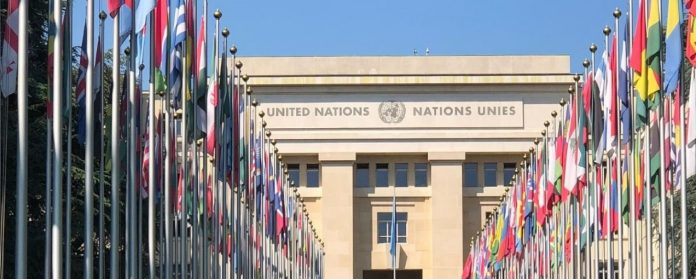Brussels, Geneva, New York, Paris, Seoul, Taipei, 4 July 2024. China’s government accepted – wholly or partially – 298 of the 428 (70%) recommendations the country received from UN member states during its fourth UPR on 23 January 2024. This represents a 12% drop in the proportion of recommendations the government accepted compared to the previous UPR in 2018.In a worrying sign of the government’s outright refusal to heed the mounting international concern over key human rights issues, of the 130 recommendations Beijing did not accept, an unprecedented number – 98 – were categorised as “rejected” and 32 were “noted”.
Despite well-documented evidence to the contrary, the government claimed that many of the recommendations it accepted were being implemented or had already been implemented. Such was the case regarding the accepted recommendations related to human rights in Hong Kong, Tibet, and Xinjiang, and the situation of human rights defenders, lawyers, civil society, media, and journalists. The government also made the false claim that it protected “freedom of speech, association and assembly” and “the lawful rights of all citizens as equals”.
FIDH, HRIC, ICT, TAHR, and NKDB urge China’s government to reverse course and use the fourth UPR to address the concerns voiced by numerous UN member states without delay by implementing all the recommendations that are consistent with its obligations under international human rights law.
Below is an analysis of the government’s response to the UPR recommendations on selected human rights issues.
Human rights situation in Hong Kong, Tibet, and Xinjiang
The government received 57 recommendations on human right issues in Hong Kong, Tibet, and Xinjiang and accepted only 19 (33%) of them. With regard to Hong Kong, the rejected recommendations were overwhelmingly related to the National Security Law and its negative impacts. Rejected recommendations concerning the situation of the Uyghurs in Xinjiang included those that called for the implementation of the 2022 UN Office of the High Commissioner for Human Rights (OHCHR) assessment on Xinjiang which China’s government called “illegal”. China rejected 70% of the unprecedented number of Tibet-specific recommendations it received – notably the ones calling for an end of the boarding school system for Tibetan children – often claiming they were based on “false information” despite many verified reports, including by UN experts. Other recommendations concerning the respect of cultural and religious rights in Tibet were listed as “accepted and already implemented” in a blunt misrepresentation of the reality on the ground. Many of the recommendations received by China’s government concerning the situation in Tibet echoed those contained in the joint submission made by FIDH and the International Campaign for Tibet (ICT) for China’s fourth UPR.
Human rights defenders, lawyers, and civil society
The government accepted only 10 of the 25 recommendations it received on human rights defenders, lawyers, and civil society. It rejected recommendations that called on China’s authorities to end the harassment and arbitrary detention of human rights defenders and lawyers and to cease the restrictions on civil society. A submission by HRIC highlights how online rights and internet freedoms in Hong Kong have significantly deteriorated in the post-COVID era, especially after the promulgation of the National Security Law, and that women have been disproportionately affected, as evidenced by the online gender-based violence they experienced.
Media and journalists
The government rejected 10 of the 14 recommendations it received concerning the protection of media and journalists, claiming the authorities protect the right to freedom of speech.
Death penalty
The government rejected all 20 recommendations it received concerning the death penalty. It stated that the death penalty “should be retained with its application strictly and prudently limited” – a statement that clashes with the reality of a country that has consistently ranked as the world’s most prolific executioner.
Refugees and asylum seekers
China received six recommendations related to refugees and asylum seekers. While it accepted three recommendations that called for the respect of the principle of non-refoulement, it rejected two recommendations that called for the adequate protection of North Korean refugees and the end to their forced repatriation. China’s government justified this inconsistent position by reiterating its false claim that North Koreans “illegally enter China for economic reasons” and are not refugees. In a joint submission for China’s fourth UPR, FIDH and NKDB addressed the various human rights violations committed by China’s authorities against North Korean refugees who had been forcibly returned to their country.
LGBTIQ+ rights
The government rejected nine of the 10 recommendations concerning LGBTIQ+ rights, including those that called for the enactment of legislation prohibiting discrimination based on sexual orientation and gender identity. The fact that these recommendations were either “noted” or “rejected” rather than “accepted and already implemented” contradicts the government’s own claim that China’s laws prohibit any form of discrimination. The recommendations received by China reflected those made by HRIC in its joint UPR submission with China Rainbow Observation, the Chinese Lala Association, and Chinese Trans Voices.
The environment, climate change, and extraterritorial obligations
On a more positive note, the government accepted all 12 recommendations related to environmental issues, including those that called for combating environmental pollution/degradation, protecting the right to a healthy environment, addressing climate change, reducing reliance on fossil fuels, and promoting energy transition. The government also accepted four recommendations on business and human rights in relation to the operations of China’s companies abroad, including those that called for the respect of the UN Guiding Principles on Business and Human Rights (UNGPs), and the implementation of the recommendations made to China by the UN Committee on Economic, Social and Cultural Rights (ESCRs). Some of these recommendations were consistent with similar recommendations made by FIDH and four of its member organizations in their joint submission for China’s fourth UPR.









































